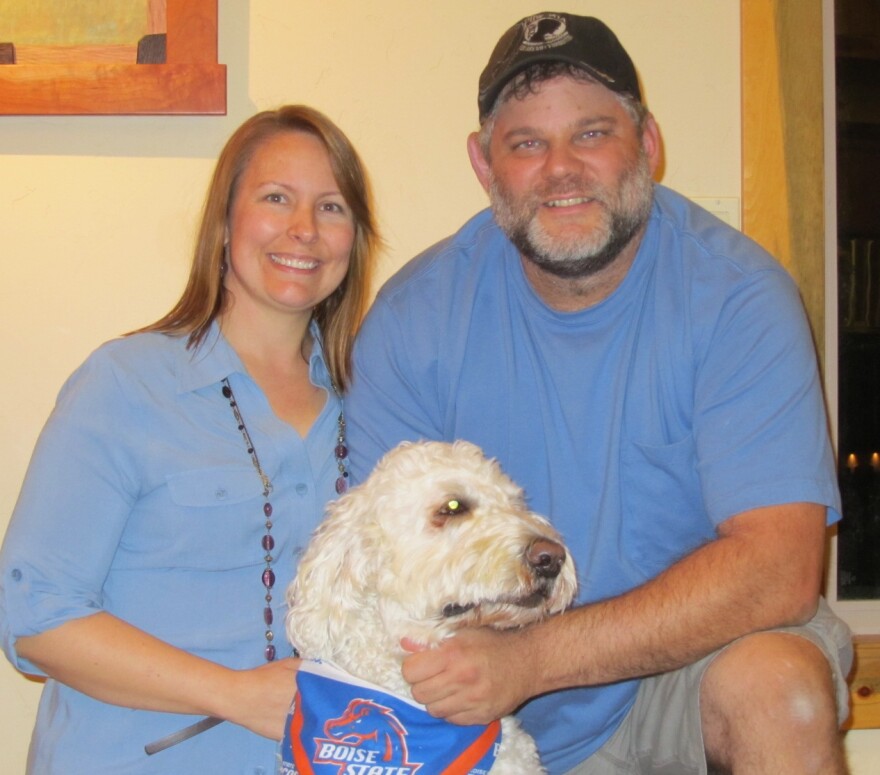Editor’s Note: This is the last installment in a three-part series exploring the benefits of service dogs for combat veterans. Reporter Samantha Wright began working on this series three years ago. The previous two parts are posted online (read part 1/ read part 2).
In the three years since Awescar entered Dan Sperry’s life, a lot has changed.
“Now I have a life,” Sperry said, sitting comfortably in his living room as we talked.
Sperry no longer fidgets; he’s more relaxed and confident. His service dog sprawls out on the floor next to the kitchen table.
“It’s amazing what a white dog can do,” said Sperry.
'It’s nice to be part of society again’

The large labradoodle helps Sperry cope with post-traumatic stress disorder. Before Awescar, Sperry was isolated and rarely left the house. These days, he goes out every day to take Awescar for a swim in a nearby creek. Sometimes the two of them go up to the gas station so Sperry can get a soda.
When people ask to pet Awescar, Sperry isn’t afraid or nervous. Instead, he strikes up a conversation, happy to talk about his dog.
“It’s nice to be part of society again,” he said.
While Sperry has been learning to live a life outside the military, Awescar has been learning, too. His training never stops as Sperry and his wife, Angie Sperry, work with him every day. The last time we talked, they were teaching Awescar the “Lassie command.” In this case, Awescar, not Lassie, is being taught to find Angie instead of Timmy.
“When Dan sends him looking for me, he will race around the house, and sniff and listen until he finds me. And he will come up and bump me with his nose,” said Angie.
'You’re never the same again, ever’
Dan still has his bad days. After his tour in Desert Storm, he came home with ferocious headaches that cause him to fall down. He often ends up with concussions. Dan’s PTSD still triggers flashbacks, panic attacks, and anxiety.
“It’s been 21 years since I was in the service, but when I close my eyes at night, I can be right there,” he said.
Dan doesn’t like to talk about his time in an artillery unit in the Persian Gulf War.
“People have no idea the steps that a soldier has to take to be able to flip that safety off on the M16, and pull that trigger. That’s something every soldier has to make personally—inside—and as soon as you do that, you’re never the same again, ever. There’s no going back,” he said.
But Dan says he would go back to the military. He misses his buddies, the camaraderie, being part of a society in which everybody understands each other.
“The call to serve never goes away. It does for some guys, but for the guys that (it) doesn’t, it’s hard. It’s hard to be out here. I got to a point where I loved the military more than I loved my wife, and I realized I needed to make a choice. And I chose her, but there still isn’t a day that doesn’t go by that I don’t regret not staying in the military,” said Dan.
'I told myself I wasn’t going to squander this gift'

Angie says in the Army, everything Dan did was to help and protect his fellow soldiers. She says he needs a higher purpose to focus on.
“Every soldier needs a mission, regardless of if they are still in the military or if they’re not,” she said. “That’s so ingrained in them.”
So Dan has become a sort of service dog ambassador. Now that he has Awescar, he’s spreading the word about how trained dogs can help soldiers in need.
“I told myself I wasn’t going to squander this gift. I’m not going to rest until every veteran that needs a service dog gets a service dog,” he said.
He speaks to large groups, telling Awescar’s story, and encouraging others to donate time or money to soldiers who need service dogs. And he shares the details of his own daily struggles.
“That’s my mission now—to bring awareness about PTSD, that it is a very, very serious, and can be very debilitating condition,” he said.
Since Dan got Awescar, he’s run into a few stores that refused service because he was with a dog. He has tried to educate them that service dogs are allowed anywhere he goes. Dan hopes that education will spread and help the next veteran who tries to enter with a service dog.
As Dan wrestles with Awescar, Angie watches the two of them play, aware of the difference Awescar has made in their lives.
“It feels so good to have someone I love so much get his life back,” she said.


